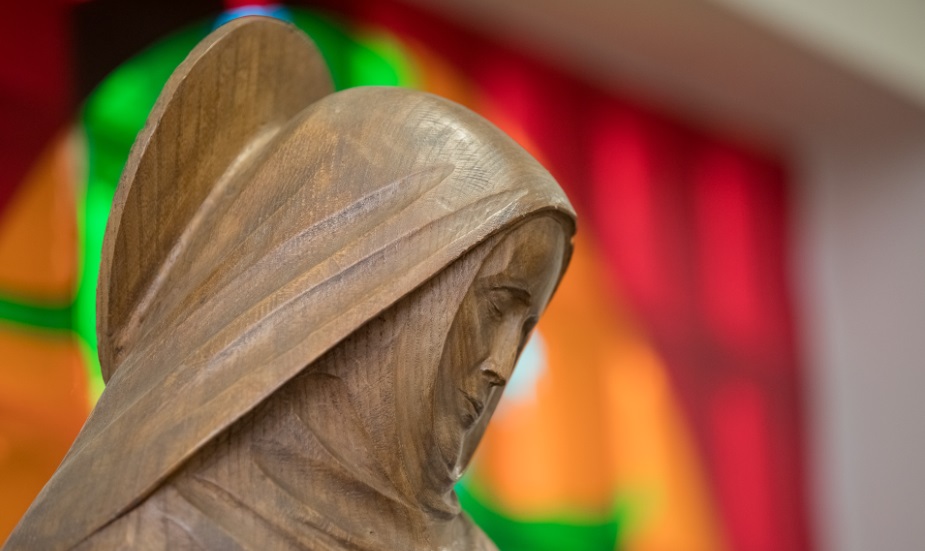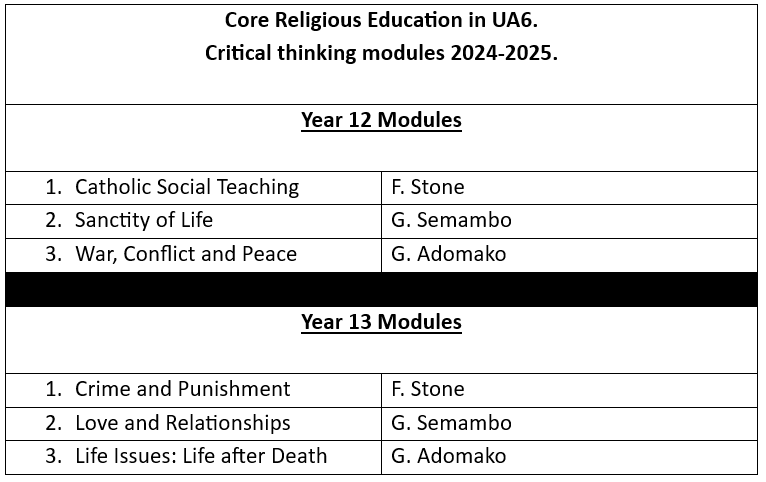Religious Education

Religious Education Curriculum Intent
The RE Department is at the heart of the school and is a core subject along with English, Maths and Science. In our Catholic school, it is essential that the content and character of our Religious Studies curriculum is Christian and, in particular, Roman Catholic. We also try to ensure that the programme satisfies other legitimate needs in a multi-faith, multi-racial and multicultural society. Our programme represents our traditional faith, preparing our students for life in the real world. Our syllabus, like the mission of the school, seeks to develop the whole person.
In KS3, all students follow the Religious Education Directory (2023) as published by the Bishops of England and Wales in Year 7. As resources allow, we are in the process of rewriting the scheme of work for Year 8 and from the academic year 2025-2026 Year 9. We are largely using the resources from Oxford University Press, 'From Source to Summit'. Presently we follow the syllabus, 'The Way, the Truth, The Life' in Year 9. This will enable all pupils to respond to God's call and deepen our understanding of the Divine revelation through the 'lenses' of Hearing, Believing, Celebrating, Living, Dialogue and Encountering.
Throughout all lessons in RE and particularly in Key Stage 3, students from other faiths are invited to share their experiences of faith with their peers. There will, of course, be similarities and differences, but the sharing of these experiences is always undertaken in an environment of respect, care and consideration. In this respect, students are often the best teachers.
Staffing
The RE department is well resourced and staffed by 4 teachers who are qualified subject specialists. The Head of RE is also a member of the Leadership Team.
The department works very closely with the Chaplaincy, which is led by our lay chaplain.
Courses
The course aims to:
- Give all students a deep knowledge and understanding of Catholicism.
- Enable pupils to see Religious Education in the context of a wider body of knowledge and skills.
- Bring the school mission statement to life for pupils and to foster the values of the gospel and the pursuit of lifelong learning.
- Allow the pupils to develop informed opinions and to be able to support them with reasonable arguments.
Key Stage 3:
RED. Source to Summit – Year 7
It is our aim that by the end of Year 7, students will have a good overview of some of the major parts of the Old Testament and how to navigate scripture. Students will study key concepts such as Creation and the Trinity. All students will have an understanding of the relevance and importance of the events leading up to and foreseeing the time of Christ. Students will also begin to study some of the Sacraments, particularly Baptism, Confirmation and the Eucharist, their meaning, scriptural basis and their importance in the life of Catholics.
RED. Source to Summit and aspects of 'The Truth'– Year 8
Year 8 seeks to build upon the scriptural foundations laid in Year 7 through the study of the Covenant with Abraham and the Exodus. Students in Year 8 will also study the Sacraments in more depth, such as the sacrament of reconciliation and the sacrament of the sick, as well as take on a project about the mission and history of the Catholic Church in Britain. Students will also have the opportunity to study some aspects of Hinduism and Islam.
Year 7 Religious Studies Grade Descriptors
Year 8 Religious Studies Grade Descriptors
Year 9 Religious Studies Grade Descriptors
'The Life' – Year 9
Year 9 seeks to deepen students' understanding of important issues such as vocation, prayer and the human community. Students are encouraged to analyse and reflect on a number of current issues. Towards the end of Year 9, in the summer term, we move more purposefully to study both Jewish beliefs and practices; this prepares students for GCSE study in Year 10 and Year 11. Throughout the KS3 syllabus, Catholic social teaching is highlighted when relevant to the topic, and we keep a keen eye on the liturgical calendar to link aspects of beliefs and teachings to the celebrations of the church.
Key Stage 4 (Year 10 and 11):
Roman Catholic Christianity (Edexcel syllabus A)
All students take Religious Education as a full GCSE. The course is a detailed and inspiring study of Catholic Christianity. Students will also undertake a study of church teaching including Trinity, incarnation and creation. Students will explore the role of Mary in the church, pilgrimage and students will be challenged to look at the sacraments, life after death and prayer and how belief affects a person’s practise of their faith. Students will need to be familiar with church documents such as ‘dei verbum’ and ‘gaudium et spes’. Students will also undertake a comprehensive study of the salvific event of Christ’s life, death, resurrection and ascension.
The examination of this component is worth 50% of a student’s final grade of their GCSE.
Philosophy and Ethics (Edexcel syllabus A)
Section 1: Students undertake a study of philosophical arguments to show both God’s existence and the divine attributes (Omnipotence, Omniscience, Omni-benevolence). As well as consider arguments about suffering and the problem of evil. Students will be expected to understand the sources of authority in Christianity, including revelation and religious experiences.
Section 2: Students will study marriage and family life in depth, examine the purposes of marriage, Christian teaching about contraception and debates around the issue of same-sex marriages. Students will need to be familiar with a range of church documents, such as ‘Familiaris Consortio’ and the Family Group Movement.
The examination of this component is worth 25% of a student’s final grade for their GCSE.
Judaism (Edexcel syllabus A)
Students undertake a study of a variety of aspects of Jewish beliefs and practises. This includes teachings about the Torah and synagogue (‘shekinah’) the concepts of covenant and messiah, as well as how Jewish moral teaching (mitzvoth) would apply to issues relating to the sanctity of life. Students will also be challenged to look at different Jewish festivals and the relationship between belief and practise.
The examination of this component is worth 25% of a student’s final grade in their GCSE. All exams are taken at the end of year 11. There is no course-work.
Key Stage 5 (Year 12 and 13):
Sixth Form
Religious Studies (OCR): This course is very popular at A-Level. Students will need to critically assess and analyse issues within Philosophy and Religious Ethics. Students will study the work of some of the greatest minds in history, such as Plato, Aristotle, Aquinas, Augustine and many others. Students will be faced with some of the oldest questions of human meaning, such as ‘What do we mean by good?’ and ‘bad’, ‘right’ and ‘wrong’?
Religious Ethics will focus on the study of various ethical issues, such as Medical Ethics, Aquinas, Natural Law and Utilitarianism. Students will need to draw conclusions about particular ethical issues from the ethical theories they have studied.
Critical Thinking & Beliefs is offered to all students as part of the wider curriculum offered in a Catholic school. The lessons are taught in form groups, using a variety of teaching and learning approaches, including a student booklet and timetabled at one period per week. The course outline is also supplemented by an array of external speakers, such as CAFOD, Marys Meals, Caritas-Calais, Pax Christi and other charities, in order to both widen the students, understanding of key themes, meet with practitioners, especially women practitioners to serve as role models, and also to offer enrichment and volunteering opportunities should they arise. The first three lessons in Year 12 follow the Ten Ten resources, ‘Life in the VI Form’.

Extended Provision
Achievement is sought through challenging academic assessment stimuli and a culture of encouraging students to develop questions and answers to the most testing questions of human meaning. The department seeks to stretch students academically and encourage them to articulate answers to profound questions of meaning.
Extra-Curricular
There are also visits from Christian Theatre groups, CAFOD and Pax Christi, Redbridge Food Bank and other guest speakers. The RE department is keen to express to students the living out of our school motto, SERVIAM. To this end, the department has developed good links with other Ursuline schools as well as ‘Ursuline Links’ and is always looking at ways of extending and making links with our wider Ursuline communities both locally and throughout the world.
